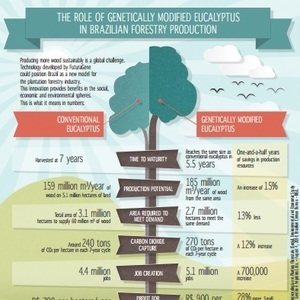Intrexon, FuturaGene collaborate on eucalyptus, poplar

FuturaGene
April 30, 2015
BY FuturaGene
Intrexon Corp., a leader in synthetic biology, and FuturaGene Group, a wholly owned subsidiary of Suzano Papel e Celulose S.A., the second largest producer of eucalyptus pulp in the world, recently announced they have entered into an exclusive collaboration to increase biomass in eucalyptus and poplar trees. FuturaGene has established itself as a leader in the development of sustainable solutions for global forestry, biofuel and agricultural markets through its proficiency in taking optimal traits from discovery to elite event selection in large scale field trials across multiple geographies as well as obtaining regulatory approval for such traits in tree crops. This collaboration will utilize Intrexon’s platform to design complex, innovative gene constructs and FuturaGene’s expertise in plant yield enhancement to cultivate improved qualities in eucalyptus, the second most widely used species in the paper and pulp industry, as well as in poplar trees.
“With Intrexon, we share a common vision to drive sustainable agriculture through continuous improvement and protection of crop yield to maximize output while minimizing inputs such as land, water, and fertilizer,” said Stanley Hirsch, group chief executive officer of FuturaGene. “Intrexon’s technology suite can help accelerate future product development in the biological engineering of a variety of species in the forestry space, and we look forward to working with them.”
Advertisement
Advertisement
In a world of precious natural resources, producing more wood sustainably without degrading the environment is a global challenge. Classic selective breeding for particular genetic traits to enhance yield has reached a point of diminishing returns in many domesticated species. The engineering of biological solutions across multiple plantation forest species has demonstrated the potential to facilitate faster growth, augment biomass, advance fiber properties, increase output potential of planted acreage, reduce the cost of wood production, and improve industrial processability of crops.
FuturaGene’s efforts have focused on eucalyptus and poplar given their importance in established industries such as paper and pulp and their emerging potential in the biopower and biofuel markets. In April 2015, FuturaGene became the first company worldwide to receive commercial approval of a yield enhanced genetically modified (GM) eucalyptus variety from the Brazilian National Technical Biosafety Commission (CTNBio). Furthermore, FuturaGene is the first foreign company to initiate GM plant trials in China where it is developing enhanced poplar trees.
“FuturaGene’s approval from CTNBio further positions the company at the leading edge of the forestry industry and we congratulate them on this recent success,” stated Nir Nimrodi, senior vice president of corporate development and head of Intrexon’s environment sector. “Together our collaboration has the potential to provide meaningful progress toward developing unique attributes and agronomic properties in plant species of economic and environmental importance.”
Advertisement
Advertisement
Under the terms of the agreement, Intrexon will receive royalties of gross profits, which are subject to increase if it elects to participate in funding development, for each product produced through the collaboration.
Related Stories
The USDA significantly increased its estimate for 2025-’26 soybean oil use in biofuel production in its latest World Agricultural Supply and Demand Estimates report, released July 11. The outlook for soybean production was revised down.
U.S. fuel ethanol capacity fell slightly in April, while biodiesel and renewable diesel capacity held steady, according to data released by the U.S. EIA on June 30. Feedstock consumption was down when compared to the previous month.
The U.S. EPA on July 8 hosted virtual public hearing to gather input on the agency’s recently released proposed rule to set 2026 and 2027 RFS RVOs. Members of the biofuel industry were among those to offer testimony during the event.
The USDA’s Risk Management Agency is implementing multiple changes to the Camelina pilot insurance program for the 2026 and succeeding crop years. The changes will expand coverage options and provide greater flexibility for producers.
The USDA’s National Agricultural Statistics Service on June 30 released its annual Acreage report, estimating that 83.4 million acres of soybeans have been planted in the U.S. this year, down 4% when compared to 2024.
Upcoming Events










